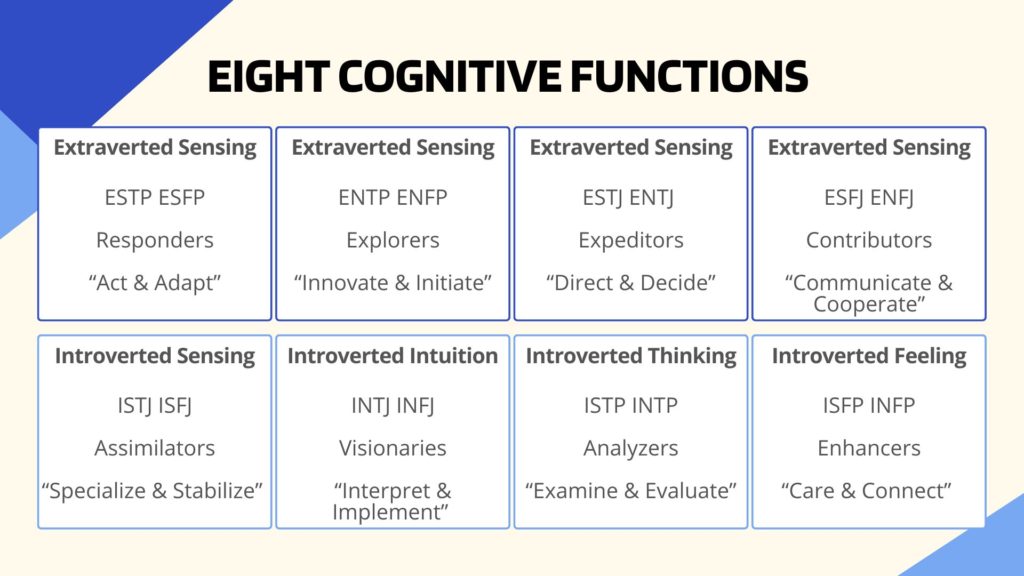The 16 MBTI types can be simplified into 8 Cognitive Functions
Important to remember:
- Everyone uses all 8 functions
- Our type determines our ability to use each function
- 2 will serve as our strengths
- 2 will serve as our weakness or blind spots
- The remaining 4 are our “Shadow Functions”, in our unconscious. Often displayed during stress
- All functions are equally valuable
The Eight Cognitive Functions
- Extraverted Sensing (SE)
- Introverted Sensing (SI)
- Extraverted Intuition (NE)
- Introverted Intuition (NI)
- Extraverted Thinking (TE)
- Introverted Thinking (TI)
- Extraverted Feeling (FE)
- Introverted Feeling (FI)
The Dominant Function
4 of the Cognitive Functions are based on “Perception”, how we take in information (S or N) The other 4 are based on “Judging”, how we make decisions (T or F)
Everyone has one favorite function among the four mental functions (S, N, T or F). Everyone uses that favorite function in their favorite (Extraverted or Introverted) world. This is what determines our Dominant Function.
- Also referred to as our Hero/ Heroine Role
- It is our default function when called to “Save the Day”
- Our natural strength
- How we are “Hard-Wired”
- Our strongest function, usually well developed by age 13
- Often the only function developed at this age.
The Auxiliary Function
We each also have an Auxiliary Function. This is our 2nd strongest function. It is also referred to as our Supportive Parent Role because we use it in a positive, helpful, and supportive way.
It is also usually the one we start with when lending help and support to others.
90% of our personality is made of these two functions: our Dominant & Auxiliary

MICHELE BURCH REID, MS FOUNDER OF LCI
More From Michele
Extraverted Feeling (FE)
Extraverted Feeling (FE) ESFJ - ENFJ The function is making decisions based on the value system that is concerned with the well-being of people. These values are more global and cultural than personal. The goal is to maintain group harmony. For...
Introverted Thinking (TI)
Introverted Thinking (TI) ISTJ - INTJ The function is making decisions based on data, categories, and theories inside your mind. Analyzing & comparing systems with others make improvements. For example:The function is making decisions based on data,...
Extraverted Thinking (TE)
Extraverted Thinking (TE) ESTJ - ENTJ The function is making decisions about the external world using objective facts. Applies criteria in a logical way while staying within the rules and policies to arrive at a defendable position or decision. For...






